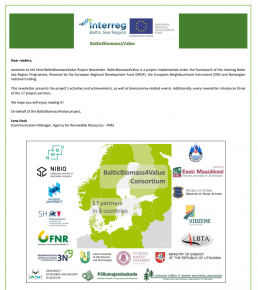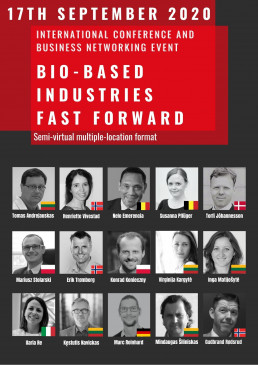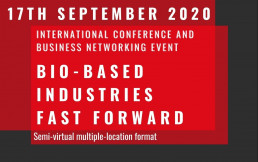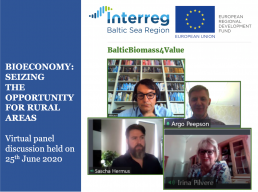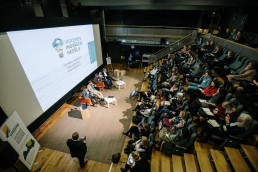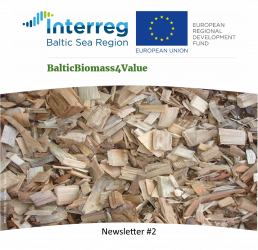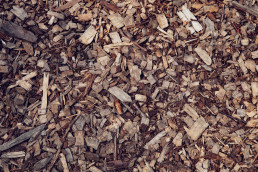3# Newsletter BalticBiomass4Value

Dear readers,
FNR, as communication manager of BalticBiomass4Value, is proud to announce that the 3rd newsletter of the project has been published recently.
Primarily, this edition informed about the six-month project prolongation, the international conference held in September and the publication of a new report on biomass value chains for improved sustainable energy use in the Baltic Sea Region. Additionally, upcoming events were listed.
To download the newsletter click here: Newsletter No. 3
You can subscribe to the newsletter here: Subscribe
We hope you enjoy reading!
For questions regarding the newsletter contact: l.huck@fnr.de
International Conference and Business Networking Event held on 17 September 2020
On 17 September 2020, an international conference was organised by the Lithuanian Biotechnology Association as a part of the BalticBiomass4Value project. Additional to the conference, three business networking events were offered by our German, Norwegian and Lithuanian partners.

International Conference
The international conference "Bio-based Industries Fast Forward" was held in a semi-virtual format at Vytautas Magnus University in Kaunas. 146 participants from the Baltic Sea Region (BSR) and beyond took part in the conference. Opening remarks were held by Tomas Andrejauskas, President of the Lithuanian Biotechnology Association, and Henriette Vivestad, Managing Director of the Norwegian Bioenergy Association. Following the opening remarks, Astrid Schomaker, Director for Global Sustainable Development in the European Commission’s Directorate-General for Environment, outlined the European Green Deal and stressed the commitment of the EU towards creating a bioeconomy, which is sustainable economically, socially and environmentally. The speakers that followed discussed various aspects of the bioeconomy and its development potential in the BSR.
After the plenary session, participants were invited to join one of the transnational business to business sessions. Topics included:
- innovative uses of various biomass resources for the production of high-value sustainable bio-based products,
- innovative uses of agricultural and aquatic biomass for the production of sustainable bioenergy and other bio-based products,
- innovative uses of forest biomass and municipal waste for the production of sustainable bioenergy and other bio-based products.
These sessions were opened with case studies of the Italian leading consortium in biotechnology "Corsorzio Italbiotec", the German biogas sector and the Norwegian biorefinery company "Borregaard AS". Various best practice examples in the BSR were provided during these sessions.
Parallel Lithuanian session: Relevant support instruments for Lithuanian businesses
The parallel Lithuanian session discussed relevant support instruments for Lithuanian businesses. The workshop was primarily a networking event and allowed businesses to exchange experience and express any issues that they face. Business enterprises were interested in learning about best practice examples in the BSR and discussed the limiting factors of strengthening the bioeconomy in Lithuania.
Parallel Norwegian session: Wrap up and ideas to follow up
The parallel Norwegian session discussed the potential of a bio-based economy. In the first section of the workshop, the possibilities in the BSR were outlined, including the EU and national policies on strengthening the bioeconomy. Afterwards, the business enterprises gave short pitches about their sector (forestry, fisheries, farming) and ways to solve possible challenges of a bio-based economy were discussed. Lastly, the participants discussed lessons learned from EU policies and whether there are alternative ways of strengthening the bioeconomy in Norway.
Parallel German session: Local heating networks with biomass and biogas as a fuel
The parallel German session discussed local heating networks with biomass and biogas as a fuel. Overall, all representatives of the small and medium-sized enterprises were optimistic that the biogas and local heating network sector will be expanded in the coming years, thereby allowing sustainable energy production for transportation and the home. Nevertheless, it was frequently mentioned that a greater willingness is needed from politicians and vehicle manufacturers to strengthen the biogas sector. Regarding local heating networks, it was stated that the acceptance of the local population determined whether the project would be implemented. Moreover, there is a general lack of knowledge about the benefits of using biomass for heating. Most consumers falsely assume that a local heating network is very expensive, which is not the case.
More information: https://balticbiomass4value.eu/virtual-international-conference-and-business-networking-event/
International Conference and Business Networking Event: Bio-based Industries Fast Forward - registration closed
On 17th September 2020, the BalticBiomass4Value project consortium kindly invites business enterprises and other bio-based economy stakeholders to attend an International Conference and Business Networking Event “Bio-based Industries Fast Forward”. The event will be held virtually with part of participants from Lithuania gathering at Vytautas Magnus University Agriculture Academy in Kaunas.
The main aim of this event is to present opportunities for the development of sustainable bio-based industries in the Baltic Sea Region and beyond, as well as to enable business enterprises to establish useful contacts for the initiation of green business development projects.
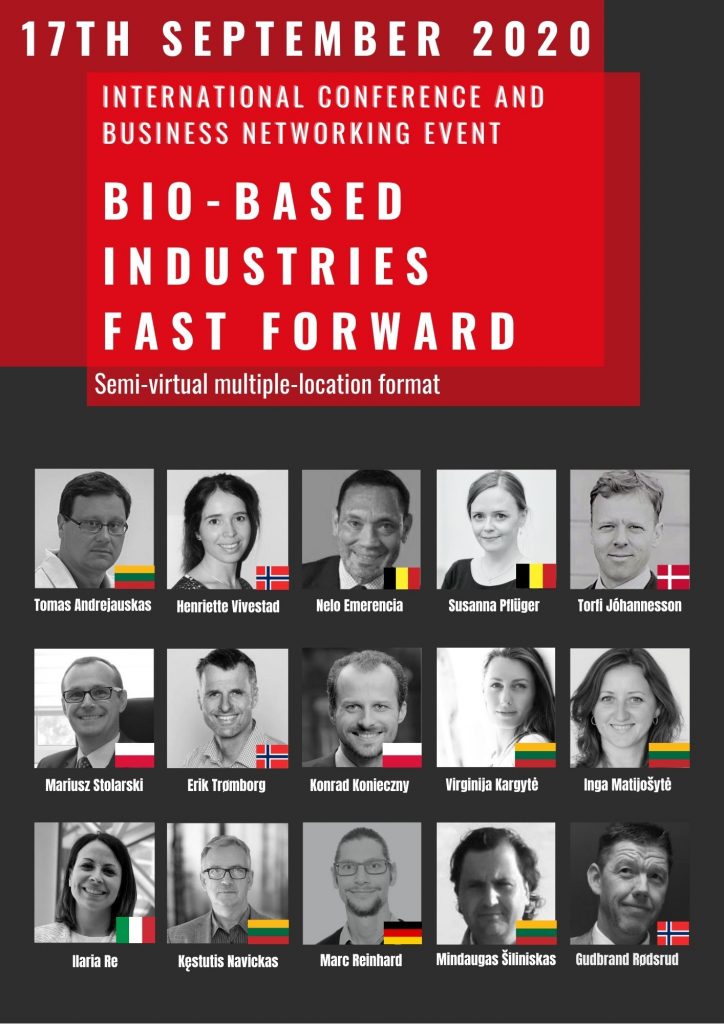
Plenary session
New speaker confirmed with presentation on the European Green Deal as an opportunity for sustainable business development (Astrid Schomaker, Director for Global Sustainable Development in the European Commission’s Directorate-General for Environment, Belgium).
Participants of the event will have an opportunity to get acquainted with the activities of the Bio-Based Industries Consortium that represents private sector in the public-private partnership with the European Commission for investing in bio-based innovations (Nelo Emerencia, Programming Director of the Bio-Based Industries Consortium, Belgium), as well as with the perspectives of the European biogas sector and innovative uses of biomass for energy and other bio-based products (Susanna Pflüger, Secretary General of the European Biogas Association, Belgium). The achievements and future directions of the Policy Area “Bioeconomy” of the European Union Strategy for the Baltic Sea Region will be also introduced to the participants (Torfi Jóhannesson, Senior Adviser of the Nordic Council of Ministers, Denmark).
Insights on the current state and future perspectives of the bio-tech and bioenergy industries in the Baltic Sea Region will be shared by leaders of business associations (Tomas Andrejauskas, President of the Lithuanian Biotechnology Association and Chairman of the Committee of Innovation, Research and Technology at the Lithuanian Confederation of Industrialists, and Henriette Vivestad, Managing Director of the Norwegian Bioenergy Association). Furthermore, the BalticBiomass4Value project experts will present their in-depth analyses on the biomass potential and its deployment opportunities in countries of the Baltic Sea Region (Mariusz Stolarski, Professor of the Centre for Bioeconomy and Renewable Energies at the University of Warmia and Mazury in Olsztyn, Poland), as well as on the prospects of the bioenergy sector in the Baltic Sea Region during times of increased competition for biological resources and low prices of fossil fuels (Erik Trømborg, Professor of the Faculty of Environmental Sciences and Natural Resource Management at the Norwegian University of Life Sciences).
Presentations will also encompass relevant funding instruments aimed at supporting the green growth, such as the European Economic Area and Norway Grants (Konrad Konieczny, Programme Officer of the European Economic Area and Norway Grants at the Innovation Norway Warsaw Office, Poland).
Parallel sessions
Transnational networking sessions will begin with an introduction to leading examples:
- Case of Consorzio Italbiotec (guest speaker - Ilaria Re, EU Project Office Director at the Consorzio Italbiotec, the Italian leading consortium in the biotechnology sector);
- Case of German biogas sector (guest speaker - Marc Reinhard, International Affairs at the German Biogas Association);
- Case of Borregaard AS (guest speaker - Gudbrand Rødsrud, Technology Director at Borregaard AS, the operator of advanced biorefinery that produces environmentally friendly biochemicals and biomaterials replacing oil-based products, Norway).
To enable exchange of interests, matchmaking and discussions, the following parallel transnational B2B sessions will be held:
- Parallel transnational B2B session 1: Innovative uses of various biomass resources for the production of high-value sustainable bio-based products (moderator - Inga Matijošytė, Head of the Sector of Applied Biocatalysis at Vilnius University Life Sciences Centre Institute of Biotechnology and Vice President of the Lithuanian Biotechnology Association);
- Parallel transnational B2B session 2: Innovative uses of agricultural and aquatic biomass for the production of sustainable bioenergy and other bio-based products (moderator - Kęstutis Navickas, Professor of the Institute of Energy and Biotechnology Engineering at Vytautas Magnus University Agriculture Academy, Lithuania);
- Parallel transnational B2B session 3: Innovative uses of forest biomass and municipal waste for the production of sustainable bioenergy and other bio-based products (moderator - Mindaugas Šilininkas, Director of Euromediena Ltd. and Vice Chairman of the Board of the Forest and Land Owners Association of Lithuania).
Parallel national sessions
Participants from Lithuania, Norway and Germany are also invited to attend national sessions that will be held after the joint transnational networking sessions:
- Parallel Lithuanian session: Relevant support instruments for Lithuanian businesses (Aktualios paramos priemonės Lietuvos verslui);
- Parallel Norwegian session: Wrap up and ideas to follow up (Oppsummering og ideer til videre oppfølging);
- Parallel German session: Local heating networks with biomass and biogas as a fuel (Nahwärmenetze mit Biomasse und Biogas als Kraftstoff).
Full agenda of the event can be downloaded here.
Language of plenary and parallel transnational networking sessions is English. National sessions will be held in native language.
Insights on status quo and future directions of the bioeconomy development in the Baltic countries
On 25th June 2020, the BalticBiomass4Value project held virtual panel discussion during the International Scientific Conference “Sustainable Bioeconomy Development 2020: From Thinking Globally to Acting Locally” which was organized by the Faculty of Bioeconomy Development of the Vytautas Magnus University Agriculture Academy and the Faculty of Economics and Social Development of the Latvia University of Life Sciences and Technologies.

During this panel discussion, Chief Adviser of the Ministry of Agriculture of the Republic of Lithuania Dalia Miniataitė, Rector of the Latvia University of Life Sciences and Technologies Irina Pilvere and Adviser of the Research and Development Department of the Ministry of Rural Affairs of the Republic of Estonia Argo Peepson introduced actions for developing sustainable bioeconomy in the Baltic countries. Meanwhile, Researcher of the School of Business, Engineering and Science of the Halmstad University Henrik Barth presented an analysis on business model innovation for biomass development and Project Manager of the 3N Lower Saxony Network for Renewable Resources and Bioeconomy Sascha Hermus introduced an example on how regional networks for the bioeconomy development operate in Germany.
Insights from the discussion
Debaters involved in formation of the bioeconomy development strategies of the Baltic countries agreed that a major challenge is to ensure the inter-institutional cooperation that is necessary, since the bioeconomy covers all areas where biological resources are used, i.e. agriculture, forestry, fisheries, food and pulp and paper production, as well as parts of chemical, biotechnological and energy industries. For instance, Latvia already has a national bioeconomy strategy, but it has been limited to biomass production and traditional biomass processing sectors, such as food production and wood processing industries. In the Western Europe, the bioeconomy development is driven by the advanced bio-based industry that develops biorefineries which use biomass for the integrated production of various bio-based products. It is not being considered how to produce more biomass, but how to use biological resources in a more innovative way. This orientation creates conditions for the development of a higher value-added bioeconomy which is the goal of all three Baltic countries.
Another important factor of success is cooperation at the local level. Experience and on-going activities of the German 3N Lower Saxony Network for Renewable Resources and Bioeconomy were presented. This network brings together local public authorities, biomass producers and processors, potential investors and scientific institutions to develop joint initiatives for local bioeconomy development. Moreover, much attention is paid for educating local communities about the principles of sustainable bioeconomy and its benefits. Interestingly, the analysis on business model innovation for biomass development completed by researches from the Swedish Halmstad University revealed that much focus in scientific literature over the last two decades was placed on cost efficiency of bio-based solutions rather than on innovation. Therefore, it could be said that social acceptance plays a crucial role in sustainable bioeconomy development.
Presentations
Lithuanian priorities for the development of bioeconomy (bioresources and biomass), Dalia Miniataitė
Developing bioeconomy in Latvia, Irina Pilvere
Developing bioeconomy in Estonia, Argo Peepson
Business model innovation for biomass development: A Literature Review, Henrik Barth
Regional networks in Germany for bioeconomy development - An Example, Sascha Hermus
Polish National Workshop
The aim of the workshop and discussion was the presentation of the project and the results of the analysis of the bioenergy related business models. In the first place, the 11 in the project analysed business models were introduced and specific aspects of the bioenergy in the Baltic Sea Region were discussed. Additionally, in a panel discussion, it was exchange how the bioenergy related business model can be transferred to Poland. With this in mind a small survey with eight questions was carried out. Immediately, participants recognized that some of the business models are already in commercial operation on the Polish market as for example:
- production of heat and fuel mainly from wood biomass,
- district heating and electricity from various sources,
- fuel and electricity from biogas.
Therefore, innovations in the field of new fuels and biochemicals as well as the circular bioeconomy for high-value products have the greatest implementation opportunities in the future. Participants also noted that business models such as the production of biopesticides, bioplastics and pharmaceuticals from biomass could be implemented in Poland and other BSR countries.
In the second part of the workshop, four companies from different sectors presented their activities and field: woody biomass logistic for bioenergy purposes, production of thermal energy from woody biomass, agricultural biogas plants and the production of high-value bio based products. Similarly, a panel discussion was conducted. There weak and strong points as well as opportunities and threats were pointed out. Finally, some conclusions for the development of SMEs in the bioenergy sector can be stated: In the one hand, the region has tremendous potential of biomass, on the other hand, it was emphasized that there are many sectors using the same type of biomass. This last point should be highlighted because it can create competition between companies and some uncertainty regarding the stable supply of raw materials. Therefore, it was suggested to classify the biomass streams in appropriate end uses or cascade use.
It was also found that the replacement of local coal-fired biomass boilers is a chance for the development of modern local bioenergy plants. Similar statements were made in the context of the production and use of RDF (Refuse derived fuel) for energy production, especially in larger urban agglomerations.
Participants described the necessity of study trips and meetings in specific companies presenting good practices in a specific sector. It was emphasized that nothing engage more people as learning specific solutions directly from the entrepreneurs. It is important to get the opportunity to talk with the people who organized and run their business successfully.
Second, it is necessary a continuous public awareness campaign about the importance of bioenergy, especially for local communities, starting from the youngest generations. As an illustration, the biogas plants or similar facilities have problems with the local communities because their operation will create inconvenience from the emission of onerous odorous.
In conclusion, the workshop participants emphasized the importance of awareness creation about possible uses of biomass in bio-based products as bioplastics, biopesticides and mineral-organic fertilizers.
Bio-based sector offers new opportunities for green growth in EU-13
The Bio-based Industries Consortium (BIC), Europe’s leading industry association putting circularity, innovation and sustainability at the heart of the European bioeconomy, has published the first three in a series of new reports mapping bio-based potential and opportunities for green growth in Central and Eastern Europe.
The new reports for Estonia, Latvia and Lithuania illustrate the untapped potential in these three countries identifying new opportunities for the primary sectors, the food and beverage sector, the blue bioeconomy, bio-based chemicals, etc. through opportunities to valorise side streams and waste that today have low or no value.
“BIC is committed to furthering the deployment of the bio-based economy in the EU-13. These reports indicate the bio-based sector’s vast and untapped potential to stimulate green growth and integrate new actors into bio-based value chains” says Dirk Carrez, BIC Executive Director.
The European bioeconomy already represents 11% of EU GDP (EU JRC report 2020) and these reports demonstrate the importance of building on Europe’s green growth potential in the next EU public-private partnership – Circular Bio-based Europe. For its part, BIC will build on the report’s findings through engagement with national authorities and local stakeholders.
These three reports are the first in a series of country reports that will cover Central and Eastern Europe. New reports for Bulgaria, the Czech Republic, Croatia, Hungary, Slovakia and Slovenia, produced as part of the BBI JU-funded CELEBio project, and two updated BIC reports for Poland and Romania, will be available later this year.
Source: BIC announcement
Latvia: Vidzeme Innovation Week 2020
At the end of February, the most prominent annual event dedicated to the development of innovation in the Vidzeme region, Latvia – Vidzeme Innovation Week 2020 – was organized by Vidzeme Planning Region and it’s cooperation partners, where science, business, agriculture, finance, culinary and other sectors were represented by multiple experienced Latvian and foreign experts, ready to share their stories on responsible innovation in lectures, masterclasses and workshops. During the conference, three parallel sessions were held, focusing on innovations in circular bioeconomy, food and gastronomy, sustainable use of resources and development of innovative services for public administration. During the parallel session “Bioeconomy Innovations in Food Production and Gastronomy” Interreg BSR 2014. – 2020. programme project “Unlocking the Potential of Bio-based Value Chains in the Baltic Sea Region” (BalticBiomas4Value) was presented in a workshop and follow-up discussion involving experts and bioeconomy area business representatives from Latvia, Austria, Finland and Estonia.
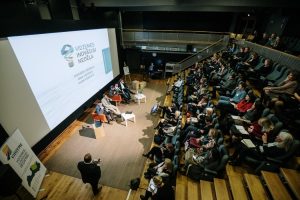
Workshop and following panel-discussion was moderated by the BalticBiomass4Value project manager in the Vidzeme Planning Region and Managing director of the project Associated partner “Latvian high added value and healthy food cluster” Kristaps Ročāns. The focus of the workshop and discussions was the presentation of the project, in particular, the results of the analysis of the good practice business models and example small and medium scale pilot business projects for sustainable bioenergy and side bio-products production in the Baltic Sea Region, and the gathering of input from the experts and entrepreneurs on the viability of various circular bioeconomy business models and most important trends shaping agri-food sector in particular.
Ants-Hannes Viira, director of the Institute of Economics and Social Sciences at the Estonian University of Life Sciences (EE), presented a variety of innovative circular bioeconomy example business cases and business models in the Baltic Sea Region and their analysis, emphasizing the necessity to focus on the sustainable biomass processing economic potential in the whole value chain:
“If we look at the policy discussions with the EU Green Deal, we have to admit that the environment and climate debate right now is very much related to energy issues, therefore it’s needed to focus not only on the top of the biomass cascade pyramid, but also on the bottom,” emphasized Viira. While sharing the knowledge on business models in BSR he noted: “In Baltic States there’s a need for stable policies. We are not used to long-term planning. Business models and cases help in understanding the business logic and inspire new ideas and applications”.
Follow up panel discussion with experts and bioeconomy area business representatives reflected on the necessity to think on the food bioeconomy business potential not only from the food processing and market focus but considering much broader value chain view.
Panelist, one of the conference keynote speakers – Johannes Kisser, Managing Director at Alchemia-Nova (AT), gave several inspiring examples regarding biomass conversion to high added value products via biorefinery innovations.
“We can divert organic waste into insect protein and then feed the insect protein to get even a better protein, higher protein fish. It is a good example of a cycle. We believe in these systems of small cycles. There are many possible combinations and symbiosis between heat producers, waste and agricultural residues. Especially small companies should create these symbiosis networks as part of their business model.”
The founder of the Institute for Environmental Solutions, entrepreneur and organic farmer Gundars Skudriņš spoke about current market and technological trends shaping bioeconomy sector businesses globally and emphasized the need to separate noise from the actual signal, because, as of now there is a lot of noise that creates false business trends, stating that globally, currently there are many companies who portray themselves as nature-friendly while simultaneously making a negative impact on the environment during the whole product production value chain. Jānis Garančs, Chairman of the board of “Latvian high added value and healthy food cluster” and general director of the Ltd. Aloja-Starkelsen – organic plant based products, food and feed ingredients producing company (one of the good practice business cases analyzed in the framework if (BalticBiomass4Value project)) stressed that the consumers must think along as they make up their food basket. Garančs encouraged everyone to learn and understand the deep meaning behind sustainability, eco friendliness, and other current trends, when creating new bioeconomy business or products – not to stay on the same small aspect that is solved already, but to look at and retain the bigger picture. He reflected on the current discussion about the new EU Greed Deal, and stated that the focus on the “farm to fork” strategy and policy level discussions is insufficient, and it should be expanded to “soil to soil” strategy, including discussions and measures across whole value chain – food, feed, fertilizer, energy, side streams valorization.
Experts and companies in the audience also discussed the challenges faced by farmers and food processing companies regarding the cooperation with scientists and bigger companies. Latvian Food Bioeconomy cluster was mentioned as a good solution for SMEs who do not have enough resources to attract knowledgeable scientists. Panelist Dr. Pekka Kilpeläinen, research manager at Oulu University in Finland (FI) provided several good practice models on natural product research and business cooperation in Finland.
“Quite often we form consortiums where several companies from our region and one or two bigger ones are represented so that an ecosystem could be formed and everyone would benefit from it,” Dr. Kilpeläinen commented.
As an example of successful R&D and business cooperation the participants were acquainted to lingonberry characteristics and various end-products from the berry processing and side streams one of which was Proanthocyanidin-rich lingonberry powder. Speaking of successful circular bioeconomy business models Dr. Pekka Kilpeläinen inspired the local entrepreneurs by saying:
“You don’t always need a big, magnificent invention to create a good, successful product. There must be a real need for it, you have to market it properly and you have to do something a bit differently.”
The session “Bioeconomy Innovations in Food Production and Gastronomy” was organised by Interreg Baltic Sea Region programme projects “Rural RDI milieus in transition towards smart Bioeconomy Clusters and Innovation Ecosystems” (RDI2CluB), “Unlocking the Potential of Bio-based Value Chains in the Baltic Sea region” (BalticBiomass4Value), Interreg Estonia – Latvia programme project “Design and promotion of tourism product based on Livonian culinary heritage” (Livonian Culinary Route) and Institute for Environmental Solutions.
Opening Conference of the BalticBiomass4Value project held during the Baltic Bioeconomy Days in Rostock on 11-12 March 2020

The BalticBiomass4Value project aims to enhance capacity of public and private actors within the Baltic Sea Region (BSR) in order to produce bioenergy in a more environmentally sustainable and economically viable way by utilising new biomass resources (primarily, biological waste) for energy production. This also includes the existing potentials to utilise bioenergy side streams for higher quality bio-based products. The opening conference provided the audience with the opportunity to have a glimpse at the first results produced from the BalticBiomass4Value project, as well as receive the most recent information regarding the relevant research and innovation activities related to the bioeconomy.
The conference began with the presentation of the preliminary results from the BalticBiomass4Value project, whereas Dr. Trømborg presented how the implementation of a CO2 tax could positively influence the biomass that is utilised within the BSR. The second presentation from Dr. Krzyżaniak demonstrated just how big the current biomass potential in the BSR is, while Dr. Ulvenblad was able to show biomass business models relevant to the sector.
The plenary session began with an overview on ongoing bioeconomy projects from the Interreg BSR Join Secretariat. Virginija Kargytė (coordinator of BalticBiomass4Value) was able to interact with experts during the closing panel discussion, which facilitated many interesting conversations concerning the analysis of suitable pathways for sustainable and renewable biomass use, especially from a regional and local perspective. The main topics of discussion were:
- How to achieve the goals of the Paris Agreement?
- What influence does the “Green Deal” have on the BSR?
- How can a higher added value in the biomass supply chain be achieved?

In the afternoon on 11 March 2020, a national workshop was held with the aim to describe the current bioenergy status in Germany. The projects, Grüne Kaskade and PalidiPRIMA, presented new potential solutions to be implemented within the biomass value chain. The second part of the workshop began with presentations from the projects RUBIZMO and GO-GRASS. The projects provide positive examples and success stories currently emerging in bio-based businesses. Finally, the first results of the BalticBiomass4Value business tool were presented in a dedicated poster session.

The third session of the project’s opening conference covered topics such as the biomass added value from algae production, the biomass supply chain in the Danube region, new technologic developments regarding alternative residue carbonisation, as well as synergies with the next generation of biomass disintegration using plasma.
The fourth session started with the MAGIC project, which focusses on biomass production on marginal lands, as well as renewable energy technologies for sustainable development of rural areas and low-carbon agriculture. Finally, Mr. Aldag as representative of the Hanseatische Umwelt CAM GmbH, introduced the project CONTRA, which demonstrates the ability to collect and recycle beach wrack for compost and soil products.
The event contained the perfect opportunity to discuss the bioeconomy transition in the BSR.

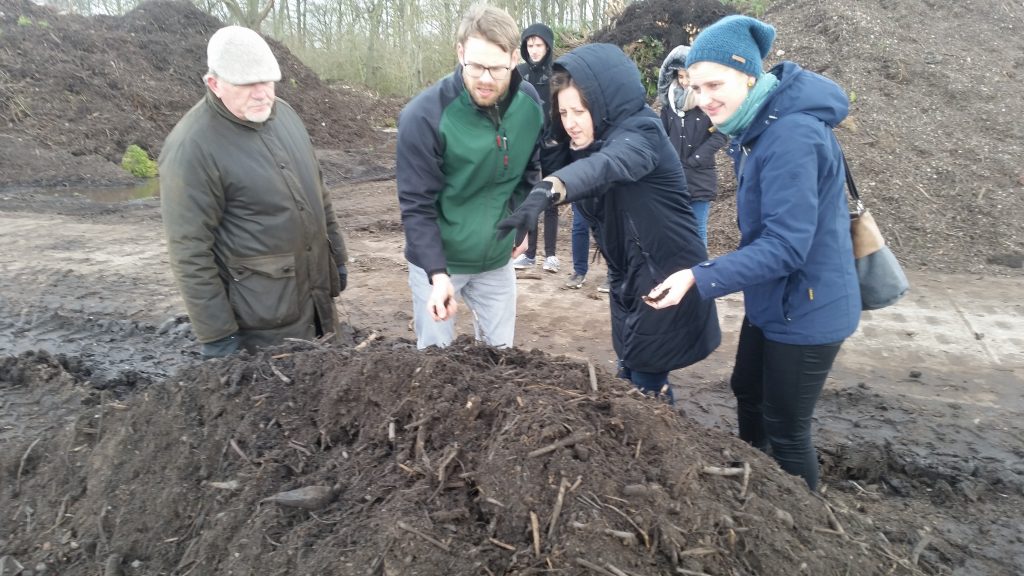
Download the agenda:
Agenda_Baltic_Bioeconomy_Days_2020
You can also download the following presentations as PDF:
Methods used to collect and recycle beach wrack for compost and soil products, Steffen Aldag
Microalgae harvest from eutrophic natural waterbodies as an ecosystem service to counteract eutrophication, Jannik Faustmann
Vital ingredients and regional hotspots for successful entrepreneurship and business in rural areas, Dr. Philipp Grundmann
Nutrients recovery in agricultural residual streams - manure, digestate and surfacewater, Sascha Hermus
Technology development for the economic and ecological utilization of biomass and other alternative residues through carbonisation processes, Dr. Bassel Ibrahim
Mapping biomass value chains for improved sustainable energy use in the Baltic Sea Region, Dr. Michał Krzyżaniak
Microwave discharges and ultrasonic – A synergy as the next generation of biomass disintegration?, Tim Kuhlow
New renewable energy technologies for sustainable development of rural areas and low-carbon agriculture, Dr. Ewelina Olba-Zięty
Bioenergy workshop introduction: Status und goals, Diego Piedra-Garcia
Overview on bioeconomy project under the current INTERREG BSR programme, Jan Schmidt
BIOproducts from lignocellulosic biomass derived from marginal land to fill the gap in current national bioeconomy (BIOmagic Project), Dr. Mariusz Jerzy Stolarski
Analysis on market outlook and future viability of different bioenergy products and value chains in the Baltic Sea Region energy system, Dr. Erik Trømborg
What do we know about business model innovation for biomass development?, Per-Ola Ulvenblad
Putting paludiculture into practice: Integration - Management – Cultivation, Telse Vogel
2# Newsletter BalticBiomass4Value
Dear readers,
FNR, as communication manager of BalticBiomass4Value, is proud to announce that the 2nd newsletter of the project has been published recently.
This issue covers a “Report on the Analysis of the Consumption, Prices and Energy Production from the Various Biomass Sources in the Baltic Sea Region”. The report is accompanied by an interview of prof. dr. Erik Trømborg (Norwegian University of Life Sciences in Ås, Norway).
Furthermore, prof. dr. Mariusz Jerzy Stolarski (University of Warmia and Mazury in Olsztyn, Poland) elaborates in another interview on the biomass value chains for an improved sustainable energy use in the Baltic Sea Region.
Last but not least, BalticBiomass4Value kindly invites to attend the BalticBiomass4Value Opening Conference, which is part of the Baltic Bioeconomy Days in Rostock (Germany) on 11th and 12th March 2020.
Stakeholder input is highly important in order to pave the way towards a sustainable future. Contributions can be discussed during a workshop and a planned field trip. Please find the agenda and information on registration here.
We hope you enjoy reading!
In order to download the 2nd newsletter press here.
For questions regarding the newsletter, please contact: D.PiedraGarcia@fnr.de
Subscribe to the Newsletter Unsubscribe from the Newsletter
More than 50 good practice examples of sustainable bioenergy and biobased production identified
In November 2019 the 3rd meeting of the BalticBiomass4Value (BB4V) project was organised by partners from 3N Lower Saxony Network for Renewable Resources (DE) and the Lead Partner Vytautas Magnus University (LT). The Latvian delegation was represented by Vidzeme Planning Region experts Kristaps Ročāns and Krišjānis Veitners together with Prof., Dr. oec., Arnis Lēnerts from Latvia University of Life Sciences and Technologies. The meeting took place in Lower Saxony, Germany, gathering 29 participants representing 16 Project Partners and 2 Associated Organizations.
The aim of the meeting was to review the progress made during the second period of BB4V’s implementation and involved the decision-making on several actions to come.
Prof., Dr. scient., Erik Trømborg, Norwegian University of Life Sciences, presented the results of the analysis on the consumption, prices and energy production from the various biomass sources in the Baltic Sea region from 2007 to 2016. It was concluded that the use of biomass for energy production has increased by approximately 40% in the last decade and solid biofuels now constitute 2/3 of used biomass. Biogas use has increased by more than 200% and currently accounts for around 15% of total bioenergy consumption in the region. Based on the analyzed data professor Trømborg has modelled several alternative scenarios on expected changes in biomass use for energy production. Results of the analysis shows that the increase in carbon prices (e.g. introduction of CO2 tax, etc.) is expected to lead to a significant increase in the use of biomass and chips for energy production. Use of the natural gas for district heating is expected to decrease, and the highest growth potential is for the wind power especially in the Baltic States. Growth is also expected regarding the energy generated from municipal waste, while the energy production from coal will most likely disappear.
Prof. Dr hab. Inż. Mariusz Jerzy Stolarski, University of Warmia and Mazury, presented the results of the analysis on the potential of several biomass sources for energy production in project partners countries. Results of the analysis show visible contrast in use of different biomass sources for district heating in each country. For example, pellets are mostly used in Denmark, Germany and Sweden, whereas in Baltic countries, where the export of pellets reaches 55%, their usage is much lower. Professor Stolarski also presented preliminary results of mapping compiling production and use of energy in project partner countries. The final version of the analysis will be available by February 2020.
One of the main activities was the analysis of 55 business cases provided by national teams to identify several good practice business models of sustainable bioenergy and biobased production in the Baltic Sea region for small and medium-scale businesses. Jüri Lillemets, Estonian University of Life Sciences PhD student, presented the initial results of cluster analysis. The selected business models will form basis for good practice guidelines for public administrations on promotion of circular bioeconomy. Initial results gave an insight on different aspects and several groups of business models were identified. Selection of business models will be verified during the upcoming workshops that will take place in 2020.
Prof., Dr. oec. Arnis Lēnerts, Latvia University of Life Sciences and Technologies and project manager Kristaps Ročāns from Vidzeme Planning Region presented an overview of the existing policy framework on Circular and Bioeconomy Policy developments for each BB4V project country. Results of the analysis show that in most of the partner countries bioeconomy is defined on a national level and the responsible institutions are involved in bioeconomy, indicating that they are ready for circular and bioeconomy policy developments. In 2020 the project partners will identify policy measures and actions that bear positive influence regarding the selected good practice examples and promotes development of competitive business models. Results of the analysis will be included in the upcoming good practice guidelines for public administrations on promotion of circular bioeconomy.
The next meeting is set to take place in March 2020 during the project opening conference in Rostock.
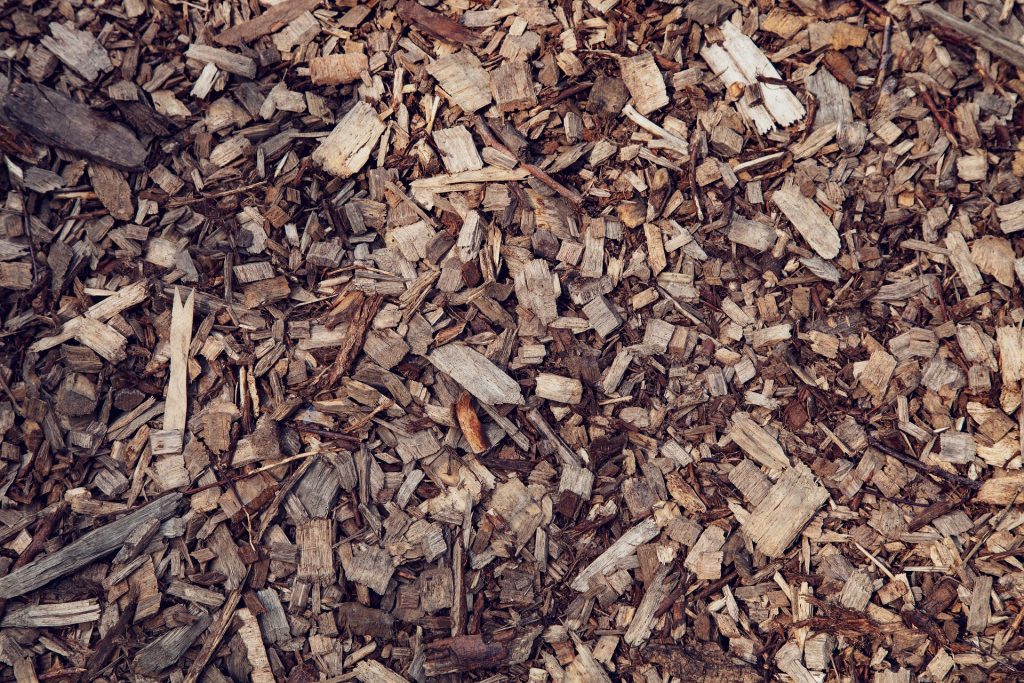
About the project BalticBiomass4Value
The project "Unlocking the Potential of Bio-based Value Chains in the Baltic Sea region (BaltiocBiomass4Value)" is being implemented in the framework of the Interreg Baltic Sea Region Programme 2014–2020. 17 partners from 8 different countries have been involved in its implementation.
The project aims to improve the capacity of public and private sector organisations and enterprises in the Baltic Sea region to manage the resources of the biomass value chain in a sustainable and economically efficient manner, promoting high added value products with renewable energy solutions and improving resource management models. Project activities are also intended to improve the capacity of public and private actors in BSR to produce bioenergy in an environmentally friendly and cost-efficient manner through the use of new biomass sources (mainly bio-waste) for energy production, as the use of bioenergy lateral flows for high-value bioproducts.

